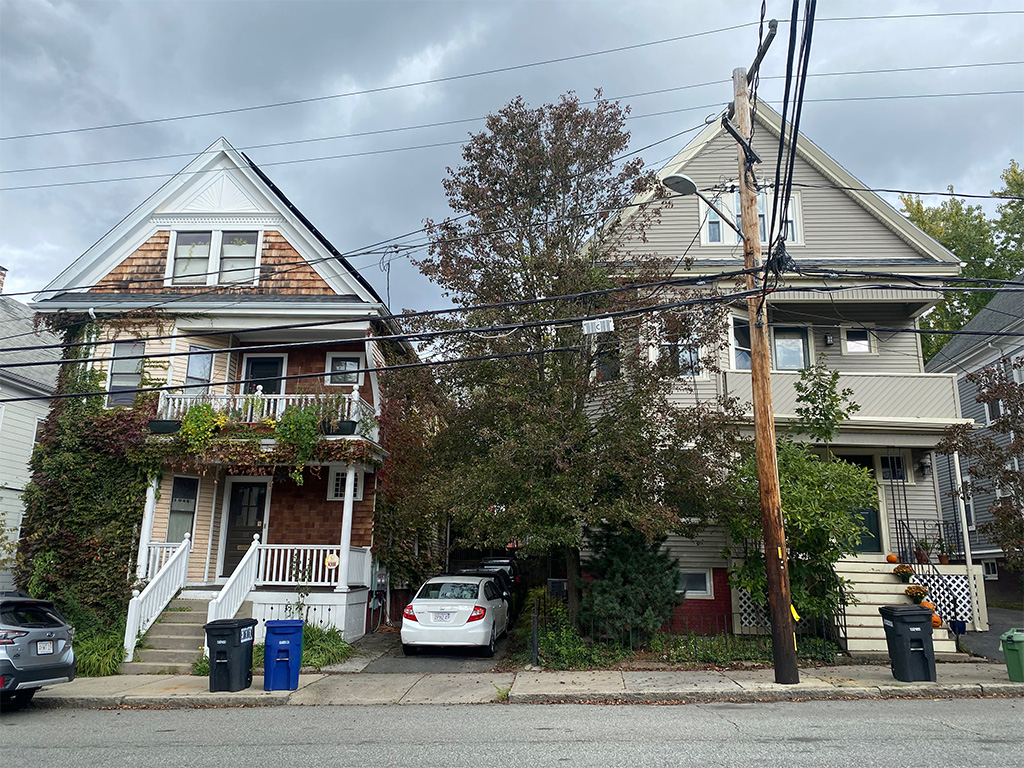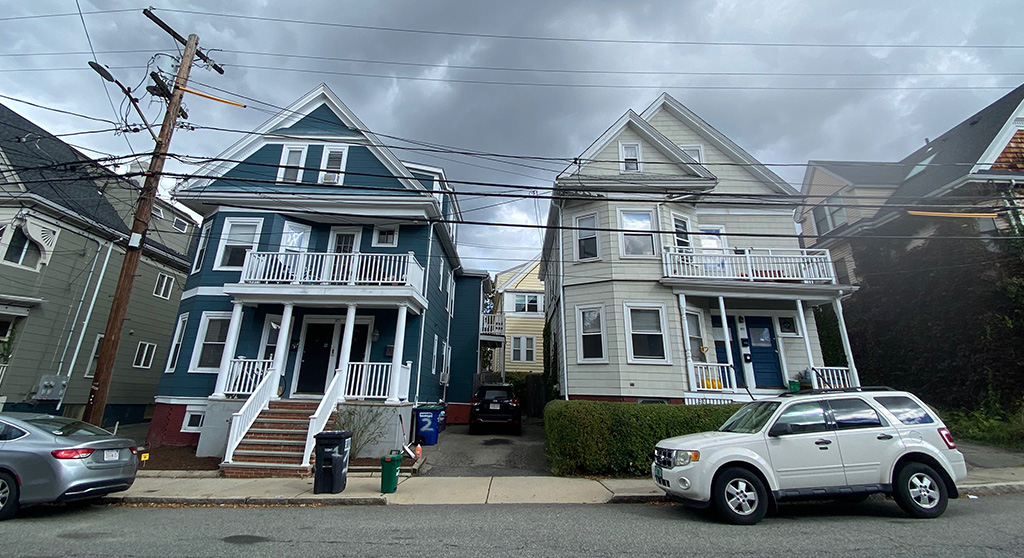Somerville triple-decker construction could rise under MBTA law but limit order for affordability

Homes on Summer Street in Somerville on Tuesday. (Photo: Marc Levy)
To comply with a state law, Somerville is moving toward making it easier to build more of its staple triple-decker homes. But the change would decrease requirements to build affordable housing.
A 2021 state law known as MBTA Communities requires cities to designate at least one zoning district within 0.5 miles of an MBTA station to reach a certain density of multifamily units. It enforces a maximum 10 percent of affordable housing in those areas, half of what Somerville usually requires in its new housing stock.
The amendments apply to the zoning districts called Urban Residential and Neighborhood Residential, which make up the vast majority of Somerville’s space – more than 60 percent, city planner Dan Bartman told a joint hearing of the City Council’s Land Use Committee and Planning Board on Thursday. There were no decisions made at the meeting, and more meetings on the issue are expected.
“I just want to sort of triple-check. If this passes,” Planning Board member Luc Schuster asked, “we would have legalized, or relegalized, triple-deckers?”.
Bartman agreed: “Houses and triple-deckers across the city would both be permitted by right and be allowed to have three units” – and all three could be market rate, whereas any development with a third unit now is required to designate one as affordable.
Little construction
There was evidence the city’s existing affordable-housing requirements were too restrictive and causing people otherwise interested in adding housing to shy away from such projects, Bartman said.
“We’ve had only three additional [affordable] third units permitted in the past four years, and to our knowledge the same number walked away,” he said.
The affordability requirement is also “continuing to cause most interest in backyard cottages to fall short of actually executing,” he said, pointing to only one backyard cottage being permitted in four years – and it was for a personal climbing wall, not a housing unit.
Most strikingly, no new triple-deckers have been permitted in the past four years, while three proposals were abandoned.
With more than 60 percent of the city’s acreage affected but only 24 acres or 9,000 housing units required by the state law, parts could be whittled away as needed. “Our proposal gives us the most flexibility for changing things in the future because it makes a large area of our city comply with MBTA Communities,” Bartman said. “We’re overshooting an area so that we can continue to plan the development of the city and not cause ourselves any problems.”.
Somerville could apply to the state to increase the affordable-housing requirement in the MBTA Communities area, Bartman said.
Four broad amendments
The amendments propose four umbrella changes applying to most triple-deckers (including larger “semi-detached” ones), duplexes, cottages (smaller, single-family homes) and backyard cottages (homes or other buildings in a backyard).
In addition to eliminating the affordable-housing requirements on residential buildings such as triple-deckers, detached houses and backyard cottages, the proposal would delete requirements for “lot depth” – essentially, the horizontal length of a property – that were eliminated in other districts during Somerville’s 2019 zoning overhaul. Bartman said they became a source of frustration for developers and the city: If a lot was slightly under the required lot depth, a housing project could easily be killed.
This proposal would also end a requirement allowing triple-decker construction in Neighborhood Residential districts only next to or directly across from another triple-decker.
Third, the proposed changes eliminate the maximum dwellings per lot for all building types in the NR district mainly to allow duplexes to include a small cottage on the same lot for an additional dwelling unit, as long as the building still complied with open space, setbacks and met Somerville’s green score requirements. With this added density, Bartman noted, duplex units could comply with Massachusetts’ MBTA Communities guidelines.
Triple-deckers or houses with up to three units with enough space could build another unit, Bartman said: “I will call out that that would be a fourth unit on the lot, just to be perfectly transparent.”.
The changes would not technically affect setbacks, public open space or green score requirements. (Setbacks and lot depth are legally different.) “All of those standards would still apply, but they would all be permitted by right now with no location criteria,” he said.
The public reacts
While residents were generally in favor of the changes, they worried about the associated costs – specifically, the elimination of affordable-housing requirements and incursions on open space.
Jennifer Civitella asked that the city consider whether there was any other way around the issue of building triple-deckers and complying with MBTA Communities without eliminating affordable-housing requirements. She proposed a home rule petition to add it back. “Letting go of that requirement for these new structures, I think, will undermine our effort for affordable housing and to get our stock up,” she said.
Tori Antonino also spoke, saying she was in favor of triple-deckers but sad that affordable housing for them hadn’t worked out. She expressed concern about open space and green scores, however. “We can’t continue to shrink lots: people need outside space,” she said.
Antonino proposed that the city require more open space for these sorts of residential developments. “We are losing open space because we’re not requiring any,” she said. “There’s no sort of percentage lot requirement that I know of or that I remember, save for certain setbacks.”




The buildings in the photo are not “Triple-deckers”. The are perhaps “Three-Family” buildings — but Somerville has many two-families that look like that and use the large attic space as additional living area for the second floor unit.
A Triple-decker is a distinct style (I doubt I can attach a photo) that typically has three stories (hence the name) with front porch and bay window on each.
Imposing an “affordability” restriction is doomed to fail in the long run. Many or most mortgage companies will not write a loan with such a restriction unless the restriction expires in a brief (1-2 year) period.
The best way to achieve affordable housing is to increase the amount of housing in the city. The best way to accomplish that is to increase housing density near subway and commuter stops — much larger buildings with many more units per building.
That’s also the best way to encourage car-free residences near transit stops. On a given lot, a taller building (with porches or other outdoor access on each floor) can increase the amount of green space for each resident.
The best approach is to stop allowing developers who build huge buildings from building and marketing them as “Luxury” residences. A brief walking tour of Assembly Square or Union Square makes this failure apparent.
If developers built “Regular Residences” instead of “Luxury Residences”, Somerville would have FAR more affordable housing. Surely new construction with regular showers and Formica countertops would still find buyers and renters.
In particular, owner-occupied two- and three-families in Somerville should be exempted from any such affordability restrictions. The city already offers property tax rebates for owner-occupied multi-family residences.
Those regulations could readily be adjusted to increase the property tax rebate for owner-occupants who offer discounts on their leases (proportional to the discount below market of the contemplated rent).
The CITY should subsidize whatever affordable housing restrictions that are needed, rather than implicitly shifting the burden to property owners or their lenders.
SomervilleTom, I totally agree on the affordability part. In terms of luxury, that’s just a useless marketing term. Other cities build plenty of condos and apartments that regular people can afford that look much nicer inside than our average apartment here and would be marketed as luxury. It is not because builders there use less expensive fixtures and kitchen counters, it’s because those cities make it legal to build multifamily homes by-right.
Insane that Cambridge, a city full of triple deckers, can’t even get behind this. No thanks to CCC of course.
“Jennifer Civitella asked that the city consider whether there was any other way around the issue of building triple-deckers and complying with MBTA Communities without eliminating affordable-housing requirements. She proposed a home rule petition to add it back. “Letting go of that requirement for these new structures, I think, will undermine our effort for affordable housing and to get our stock up,” she said. .”
Yes please, let’s hear the ideas roll in – it seems like in practice you’d rather no new housing for anyone – but I’m happy to hear your ideas for how Somerville can increase it’s affordable housing and market rate housing -or do you think some people deserve housing (sub-market) more than others (market rate).
Housing is expensive here (and across the country) because there is not enough of it in desirable places like Somerville. Any new housing will improve supply, give buyers some choice, cut down on bidding wars, and so make housing more affordable across the board. Houses last a long, long time, and we might as well build nice ones.
“Other cities build plenty of condos and apartments that regular people can afford that look much nicer inside than our average apartment here ”
Yup. And people should move there. Not everyone can afford to live in Manhattan.